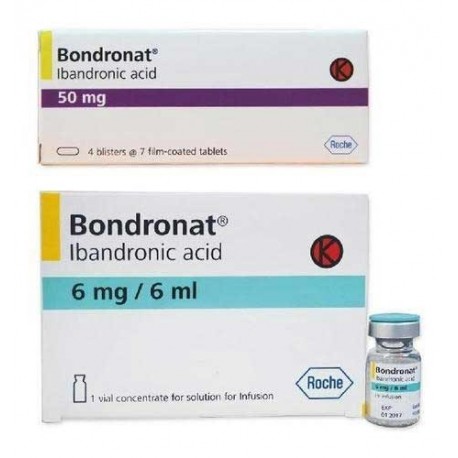 View larger
View larger Bondronat (ibandronic acid) Tablets&Vial
New product
BUY MORE PAY LESS
| Quantity | Discount | |
|---|---|---|
| 2 | 5% | |
| 3 | 10% | |
| 4 | 15% | |
| 5 | 20% |
Volume discounts
| Quantity | Discount | You Save |
|---|---|---|
| 2 | 5% | Up to $11.90 |
| 3 | 10% | Up to $35.70 |
| 4 | 15% | Up to $71.40 |
| 5 | 20% | Up to $119.00 |
More info
BONDRONAT ROCHE 50 mg film-coated tablet To be taken orally.
Active ingredient
Each film tablet contains 50 mg of ibandronic acid.
Excipients
Tablet core: Lactose monohydrate, povidone, microcrystalline cellulose, crospovidone, stearic acid, colloidal anhydrous silica. Film coating mixture: Hypromellose, titanium dioxide (E171), talc, macrogol 6000.
1. What BONDRONAT ROCHE is and what it is used for
• The active ingredient of BONDRONAT, ibandronic acid, belongs to a group of drugs known as bisphosphonates. It prevents increased calcium loss from bones (bone destruction) and bone disorders and fractures associated with the spread of cancer cells to the bone.
• BONDRONAT film-coated tablets are supplied to the market in packages of 28 and 84 tablets in oblong-shaped, white to off-white L2/IT-printed blisters (aluminium) containing 7 tablets each.
• BONDRONAT is used to prevent skeletal events (abnormal fractures, bone disorders requiring radiation therapy and surgery) in breast cancer patients whose cancer cells have spread to the bone.
2.How to use BONDRONAT ROCHE?
Always take BONDRONAT exactly as your doctor has told you. If you are unsure, check with your doctor or pharmacist.
Instructions for proper use and dose/frequency of administration
The usual dose of BONDRONAT is one tablet per day.
Application route and method
To reduce possible irritation, it is important to follow these guidelines:
• Take your Bondronat tablet only with a full glass of water (approximately 200 mL) BEFORE you take your first food, drink or other medication of the day. Do not take your tablet with any beverage other than drinking water.
• Do not chew, suck or let the tablet dissolve in your mouth.
• After taking your BONDRONAT tablet, wait at least 30 minutes before taking your first food, drink or medication of the day.
• You should stay in an upright position (sitting or standing) while taking BONDRONAT tablets and for 60 minutes after taking your tablet.
• You should continue to use BONDRONAT as long as your doctor has prescribed the medicine for you. BONDRONAT can help you get treatment as long as you continue to take the tablets.
different age groups
Use in children
Use in the elderly
Use in the elderly
No dosage adjustment is required in elderly patients.
Special use cases
If you have kidney problems, your doctor may reduce your dose to one tablet every 2 days or one tablet per week.
Liver failure:
No dose adjustment is necessary.
If you have the impression that the effect of BONDRONAT is too strong or too weak, talk to your doctor or pharmacist.
If you use more BONDRONAT ROCHE than you should
If you have accidentally taken too many tablets, drink a glass of milk and consult your doctor immediately. Do not try to vomit and do not lie down.
3. What are the possible side effects?
Like all medicines, there may be side effects in people who are sensitive to the substances contained in BONDRONAT ROCHE.
If any of the following occur, stop using BONDRONAT and IMMEDIATELY inform your doctor or go to the nearest hospital emergency department:
• Bleeding from wounds/wounds that may exist in the gastrointestinal tract.
This is a serious side effect. If you have this condition, you may need emergency medical attention or hospitalization.
If you notice any of the following, tell your doctor immediately or go to the nearest hospital emergency department:
• Digestive difficulties
• Chest pain
All these are serious side effects. Emergency medical attention may be required.
Tell your doctor if you notice any of the following:
Common side effects:
• Nausea
• Stomach ache
• Burning in the esophagus
• Tiredness
• Low calcium levels in the blood
Uncommon side effects:
• Flu-like symptoms
• not feeling well
• Pain
• Itching
• gastritis
• Difficulty in swallowing
• dry mouth
• Tingling sensation (paresthesia)
• Strange taste sensation in the mouth
• Anemia
These are mild side effects of BONDRONAT.
Uncommon in blood tests, low levels of hemoglobin (anemia), high levels of urea, high levels of parathyroid hormone, and low levels of calcium have been reported.
Bone tissue defect in the jaw is mostly seen in cancer patients.

